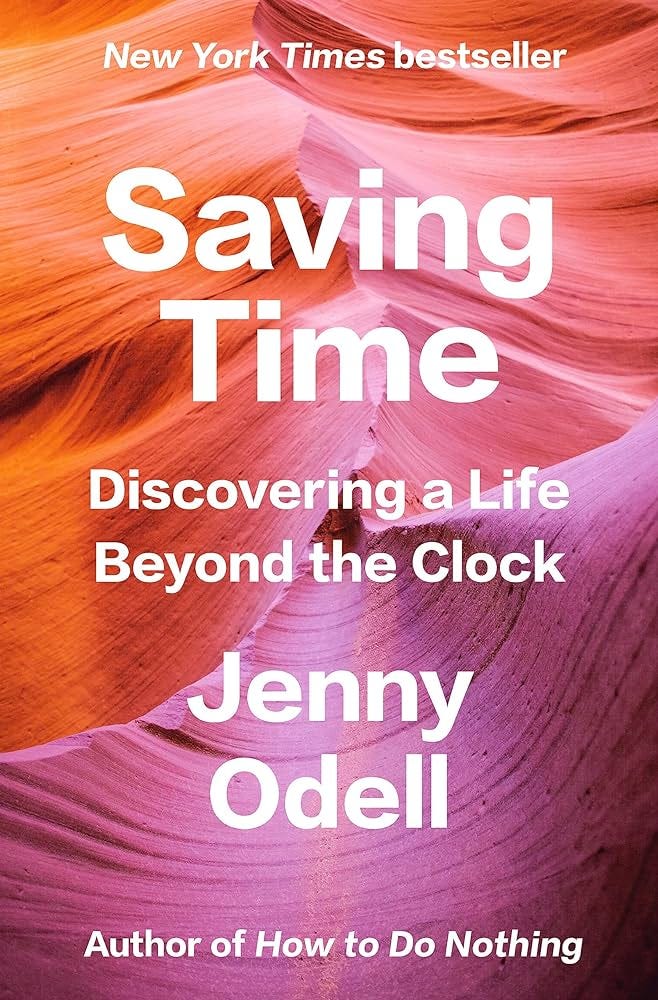I like to know the value of things. How much something costs vs. how much it's worth vs. how much it cost to make. For example, I know that a designer t-shirt can have a high price even if it is identical to a fast fashion t-shirt, and that the labor conditions of both are probably poor. I know that a vintage t-shirt on eBay can have a higher price than a new one, even with stains and holes.
I tend to ask these same questions about my own value, too. How much is my time worth? What does my work cost? What is the emotional and mental price of my labor? Is making money more valuable than preserving my sanity?
I recently read Jenny Odell's book Saving Time, a broad exploration of time, clocks, labor, leisure, and other topics relating to the hours in a day. In a chapter about the relationship between work and time, Odell talks about how an employer can yield time as a tool against their employees.
"If time is money, it is so in a way that's different for a worker than an employer. For the worker, time is a certain amount of money—the wage. But the buyer, or employer, hires a worker to create surplus value; this excess is what defines productivity under capitalism. From an employer's point of view, purchased time could always yield more money," Odell writes.
I quit my job a few weeks ago because I realized that my employer was trying to squeeze as much labor out of my time as possible. My workload was increasing at an unsustainable rate and my employer made it clear they had no plans to help alleviate this. Eventually, the mental cost of this labor had eclipsed the importance of the money I was making. Of course there's a literal and metaphorical cost to being unemployed, too.
When I'm applying for jobs, which I have been doing on and off — but mostly on — for three years straight, I often see jobs I might be interested in but I know I'm not what they're looking for because the salary is too high, meaning they're looking for someone more senior. It's not my job to tell someone I'm not qualified, but after applying to hundreds of jobs in my life, I have to weigh whether it's worth my time and energy to apply for something I feel pretty confident I won't get.
Recently, I've been watching Antiques Roadshow before bed because it's a good show to watch if you want to relax or get sleepy due to its slow format. Sometimes if I want to take a nap, I put on Roadshow specifically to fall asleep to. I would put it on as background viewing when I used to work a shift at 4 a.m. on Saturdays. I didn't grow up on Roadshow, but I got into it when I learned there's a full Roku channel dedicated to it (plus one for Antiques Roadshow UK).
I love antiques and love learning about where they're from and how much they're worth, both from a monetary standpoint and a personal one. There's a monotony to the show that I find soothing; while the objects are different every time, every episode is basically the same.
I don't really fantasize about winning the lottery, but I do fantasize about bringing a random piece of art I got at an estate sale to Antiques Roadshow and being told that, actually, it's worth $20,000-30,000. Imagine the whole trajectory of your life and of your finances changing because 10 years ago you randomly bought a pretty vase only to learn it was made by a French glass company in 1810. If Antiques Roadshow came to my city, I would immediately sign up to go and figure out what to bring later. There's a big painting on the wall of my apartment that came with the place, and it's probably just a regular painting, but what if a Roadshow appraiser told me it was done by Picasso's cousin and is extremely rare? I have some antique Japanese prints from my grandma, who loved antiquing, and they could be worth $10 but they could be worth my weight in gold. (Just googled and my weight in gold is $4.1 million).
There are certain items that, when presented on Roadshow, you just know are going to be a banger. Anytime someone brings a watch, for example, especially a pocket watch, you know it's gonna be a high price. And when it's a Patek Philippe watch? Oh baby. I'd never heard of Patek Philippe until this show, but they're some of the most expensive watches in the world; the most expensive wristwatch ever sold at auction was a Patek Philippe for $31 million.
In the same chapter of Saving Time, Odell writes about how the structure of telling time by dividing the day into 24 hours is a relatively modern invention, and how its implementation was tied to Christianity and colonialism.
"For example, when in the sixteenth century an Italian Jesuit brought mechanical clocks to China—which had a long tradition of astronomical clocks driven by water, but did not organize life or work around anything more numerically specific than calendar dates—they were not embraced. Even in the eighteenth century, a Chinese reference book called Western clocks 'simply intricate oddities, destined for the pleasure of the senses'."
Odell also describes how Cistercian monks developed bell towers for their monasteries to signify when the monks were supposed to pray, writing "this technology, having developed in the monastery, caught on in a new context: the public and private clocks that spread as European towns centralized power and commerce…The clocks not only helped them conduct trade but also marked the outer bounds of the day's worth of labor brought from workers with nothing but labor time to sell."
The job I recently left had a curious structure. I worked from home most of the time, but I was still constrained to a specific shift, which, at the time I quit, was 1-10 p.m. Though it was a news editing job, I often felt it had more in common with a service industry job in terms of structure because we would get long queues of stories waiting to be edited, so there was a visual representation of how busy it was at various times of the day. Our shifts were technically 9 hours long because of a one hour unpaid break. The job paid hourly ($22 an hour) but unlike other hourly jobs, we were not allowed to take unpaid time off. For example, you couldn't just have someone cover your shift; you had to make up that shift elsewhere. This mattered because we only had 10 vacation days but no holidays off. If you wanted to take a holiday like Labor Day off, you had to use a vacation day, which is obviously antithetical to the concept of Labor Day.
At that job, any time I was not working was valuable to me, not just because of how much I disliked the time when I was working, but because I felt so aware of the way my employer controlled my time. Of course now I'm unemployed so my time has taken on a completely different meaning. My time isn't controlled by anything specific, and for the most part, I can do what I want, when I want. I'm someone who can find a lack of structure like this overwhelming, but right now I find it freeing. One day, ideally, I will get another job (please!) where I will have to adjust to the new ways my employer controls my time, but I have a better understanding now of what my time is worth.





